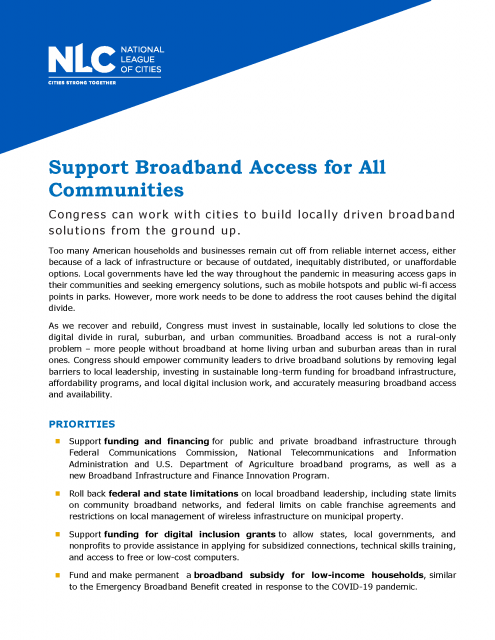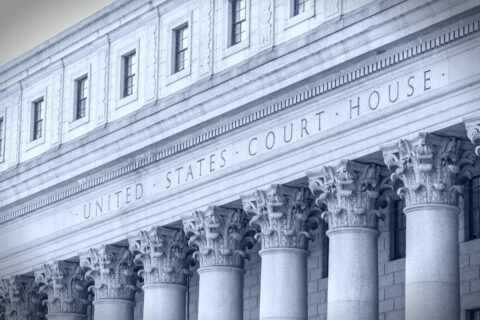Too many American households and businesses remain cut off from reliable internet access, either because of a lack of infrastructure or because of outdated, inequitably distributed, or unaffordable options. Local governments have led the way throughout the pandemic in measuring access gaps in their communities and seeking emergency solutions, such as mobile hotspots and public wi-fi access points in parks. However, more work needs to be done to address the root causes behind the digital divide.
As we recover and rebuild, Congress must invest in sustainable, locally led solutions to close the digital divide in rural, suburban, and urban communities. Broadband access is not a rural-only problem – more people without broadband at home living urban and suburban areas than in rural ones. Congress should empower community leaders to drive broadband solutions by removing legal barriers to local leadership, investing in sustainable long-term funding for broadband infrastructure, affordability programs, and local digital inclusion work, and accurately measuring broadband access and availability.
City Priorities
Support funding and financing
Support funding and financing for public and private broadband infrastructure through Federal Communications Commission and U.S. Department of Agriculture broadband programs, as well as a new Broadband Infrastructure and Finance Innovation Program.
Roll back federal and state limitation
Roll back federal and state limitations on local broadband leadership, including state limits on community broadband networks, and federal limits on cable franchise agreements and restrictions on local management of wireless infrastructure on municipal property.
Support funding for digital inclusion grants
Support funding for digital inclusion grants to allow states, local governments, and nonprofits to provide assistance in applying for subsidized connections, technical skills training, and access to free or low-cost computers.
Fund broadband subsidy for low-income households
Fund and make permanent a broadband subsidy for low-income households, similar to the Emergency Broadband Benefit created in response to the COVID-19 pandemic.
Increase flexibility in the E-Rate program
Increase flexibility in the E-Rate program, to allow anchor institutions like schools, libraries, and community centers to serve as connectivity springboards for their surrounding communities.
Modernize broadband measurement and data collection
Modernize broadband measurement and data collection systems by directing the Federal Communications Commission to not only collect more geographically precise information about broadband access and infrastructure, but also to collect and make publicly available information about broadband subscription costs, network performance, and reliability.
Legislation NLC Supports
- The Accessible, Affordable Broadband for All Act (H.R. 1783 /S. 745) – Legislation to invest in broadband infrastructure, establish a new broadband infrastructure financing program, enable municipal broadband, fund E-Rate and Emergency Broadband Benefit programs, establish a new block-grant and competitive grant digital equity fund, and direct FCC policy on broadband data and network resilience
- The Community Broadband Act (H.R. 1631) – Legislation that would enable municipally-owned or operated broadband networks throughout the country by removing state legal barriers to local investment in broadband infrastructure.
- Broadband Provisions within the LIFT America Act (H.R. 1848) – Wide-ranging infrastructure package; broadband provisions would fund broadband infrastructure, establish a new broadband infrastructure financing program, enable municipal broadband, fund E-Rate and Emergency Broadband Benefit programs, establish a new block-grant and competitive grant digital equity fund, direct FCC policy on broadband data and network resilience, and provide resources for Next Generation 9-1-1.
- Protecting Community Television Act (H.R. 5659/S. 3218; 116th Congress) – Would protect local governments and their community media assets by clarifying the federal definition of franchise fees, reversing an overreaching 2019 Federal Communications Commission order and prevent future similar harms.
- Accelerating Broadband Development by Empowering Local Communities Act of 2019 (H.R. 530; 116th Congress)/ Restoring Local Control Over Public Infrastructure Act of 2019 (S. 2012; 116th Congress) – Would reverse harmful Federal Communications Commission regulations limiting the ability of local governments to responsibly manage the deployment of 5G wireless infrastructure on public roads.









